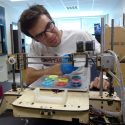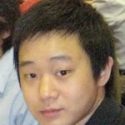Medical device refinements top student design competition
Designed by University of Wisconsin–Madison biomedical engineering students, a device that improves the diagnostic yield of fine-needle aspiration, a sensory-substitution device for hearing impairment, and a magnetic-resonance-compatible device for imaging lower extremities during movement received top honors in the first annual Tong Biomedical Engineering Design Award competition.
The competition took place May 4 on the UW–Madison College of Engineering Campus. Nearly 150 biomedical engineering students displayed posters and prototypes of medical devices and innovations that they designed and refined for a semester or more. One team in each grade level-sophomore, junior and senior-received awards.
Sophomores Chou Mai, Jason Tham, Robyn Hrobsky and Aaron Freis designed the fine-needle aspiration improvement. For client Dr. Frederick Kelcz, a radiologist at UW Hospital, the students delivered a mechanical-electrical device that improves on the current manual method for obtaining tissue samples for diagnosis.
Juniors Jimmy Fong, Jack Page, Ryan Thome, Becky Jones and Matt Valaskey invented an auditory substitution device that uses vibro-tactile stimulation to substitute for regional frequency hearing loss for client and audiologist Veronica Heide.
And for client Darryl Thelen, a UW–Madison associate professor of biomedical and mechanical engineering who studies such sports-related injuries as hamstring tears, seniors Eric Bader, Arinne Lyman, Christopher Westphal, Sarajane Stevens developed a device that can image and measure muscle motion and joint kinematics during movement under load.
A follow-up competition award will provide funding to enable a junior or senior design team to further research and develop their design. Ultimately, that goal is to advance the invention to commercialization.
Sponsored by UW–Madison electrical engineering alumnus Peter Tong via the Tong Family Foundation, the Tong awards reward biomedical engineering undergraduate teams that design innovative solutions and develop outstanding prototypes. Their work addresses real challenges that UW medical and life sciences faculty and area biomedical companies face and offer for the students to solve.



